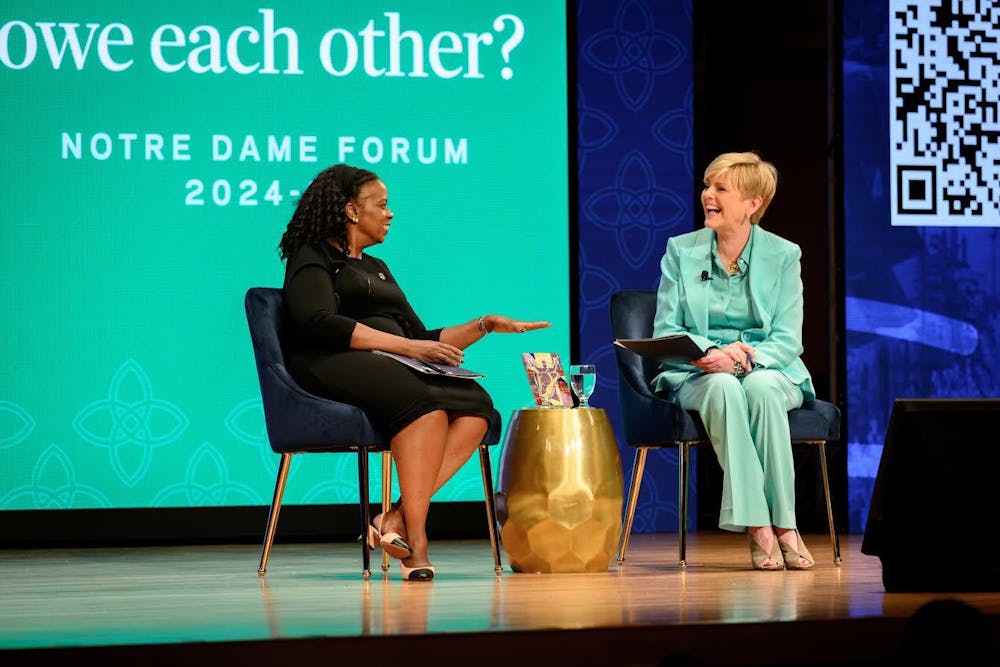Sanda Ojiambo, the executive director of the United Nations Global Compact, spoke on innovative thinking in business leadership during one of the four forums taking place at the University of Notre Dame during University President Fr. Robert Dowd’s inauguration week. Ojiambo emphasized the importance of sustainability, inclusive development and ethical decision-making as essential elements for addressing the world’s most pressing challenges.
In her remarks, Ojiambo stressed that businesses must go beyond profit and act as a force for good. She pointed out that many CEOs today are not losing sleep over profits or market share, but are instead preoccupied with broader issues such as inequality, climate change and social cohesion.
“We can’t solve the environmental crisis without a socially cohesive society, and we certainly need better governance around institutions,” Ojiambo said.
Ojiambo cited a survey conducted by the Global Compact, which found that nearly all CEOs worldwide felt ill-equipped to deal with the challenges faced over the past few years.
“We have a program at the Global Compact called PRME, the Program for Responsible Management Education,” Ojiambo said. "The initiative works with 800 universities globally to rethink business management education to better address the complexities of today’s world.”
Addressing gender equity in the workplace, Ojiambo called for more women in science, technology, engineering and math (STEM) fields, citing the low numbers of women in these areas as a concern. She shared an anecdote from her time in the telecommunications industry in Kenya, where she spearheaded efforts to mentor girls and women in STEM starting in high school.
“They said, ‘we’ve just never seen a woman engineer,’” Ojiambo said. “That just underscores the importance of role models and mentorship.”
She urged both men and women to offer mentorship to younger women to help increase representation and diversity in these critical fields.
On the role of small businesses, Ojiambo acknowledged their importance in driving economies, particularly in creating jobs and supporting local communities. However, she mentioned the difficulties they face in adopting sustainable practices due to resource constraints.
“I see a huge responsibility and opportunity by the multinational, the large corporate, to help build that resilience,” Ojiambo said.
Ojiambo also spoke candidly about the polarization surrounding environmental, social and governmental (ESG) investing in the United States, noting the debate is highly politicized compared to Europe, Asia and Latin America. Despite the skepticism, she emphasized the importance of ESG frameworks and argued for a continued focus on the positive impact that businesses can make.
“We need to push more around what is good within ESG. We don’t hear enough about that,” she said.
When asked how to maintain unity in a global organization like the UN Global Compact, which operates in 160 countries, Ojiambo acknowledged that complete unity might not be possible or even desirable.
“I love challenges, and I love feedback,” Ojiambo said.
She highlighted the value of diverse perspectives and dissenting voices as catalysts for growth and innovation. However, she underscored the need for a shared commitment to humanity and respect.
When asked “What do we owe each other?” She outlined three key principles: solidarity, empathy and compassion.
“We owe each other just the thought that we live in one world, and the world will not prosper if only one part of the world prospers,” Ojiambo said.
Focusing on her personal background — growing up in Africa and having family educated at Harvard — she called for greater understanding and accountability among global citizens and leaders.
“If we all start practicing solidarity, empathy and compassion, our world will be a better place,” Ojiambo said.










